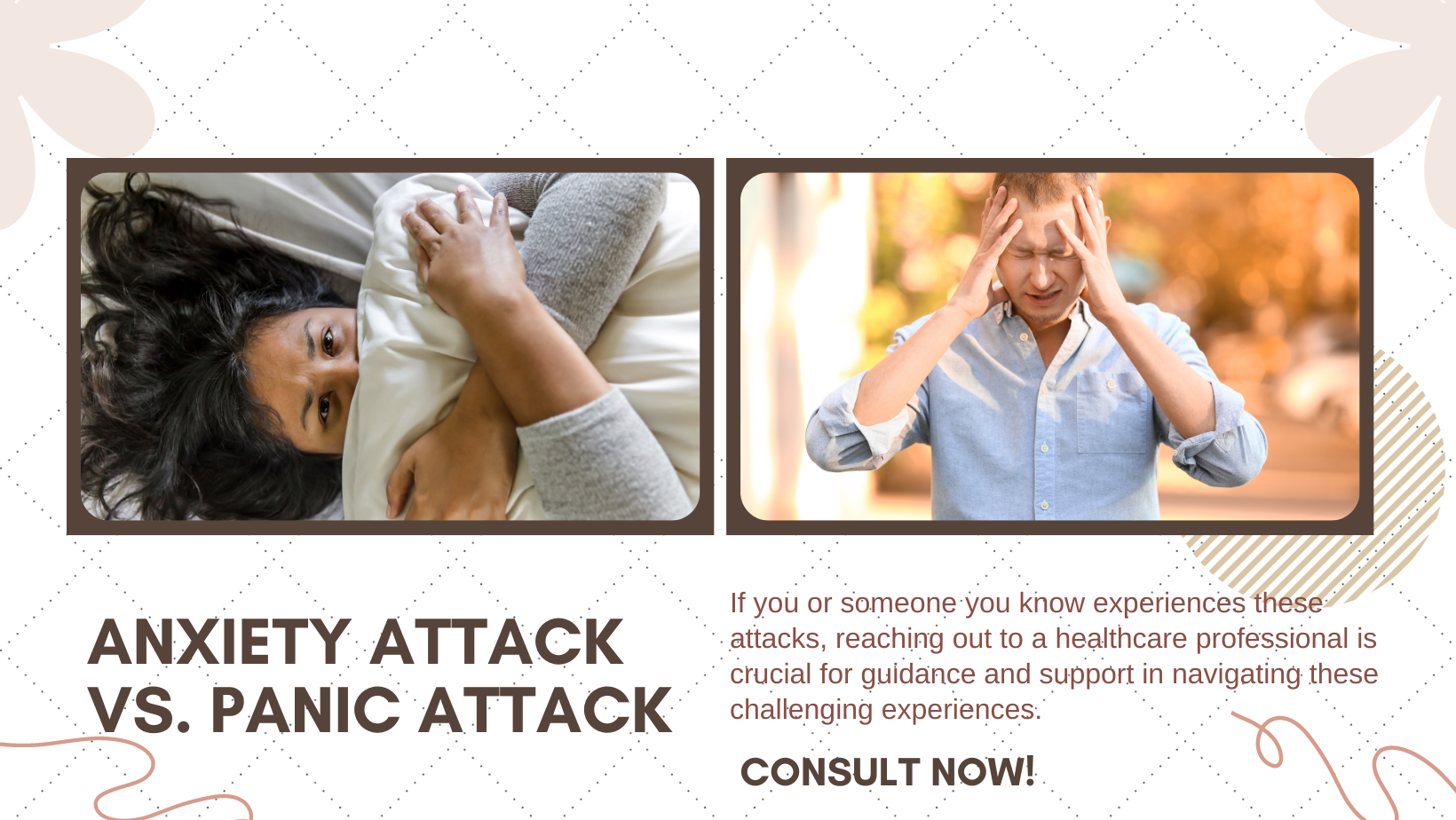
Anxiety Attack vs. Panic Attack: Understanding the Difference
Anxiety and panic attacks are terms often used interchangeably, but they actually represent distinct experiences with different characteristics and triggers. Understanding the differences between anxiety attacks and panic attacks can help individuals recognize their symptoms, seek appropriate support, and develop effective coping strategies. In this article, we will delve into the nuances of anxiety attacks and panic attacks, shedding light on their symptoms, causes, and potential treatments.
Anxiety Attacks: An anxiety attack, also known as a panic attack, is a sudden episode of intense fear or apprehension that typically arises in response to a specific trigger or stressful situation. These attacks often manifest as a response to anticipated or perceived threats, and the individual may feel overwhelmed by a sense of impending danger. You may consult with the best anxiety doctor to get a better treatment for Anxiety. Symptoms of an anxiety attack may include:
- Increased heart rate and palpitations.
- Rapid breathing or shortness of breath.
- Chest pain or tightness.
- Sweating or trembling.
- Feeling lightheaded or dizzy.
- Nausea or stomach discomfort.
- Feeling a sense of impending doom.
- Restlessness or feeling on edge.
- A strong urge to escape the situation.
- Hypervigilance or heightened sensitivity to surroundings.
Panic Attacks: Unlike anxiety attacks, panic attacks are typically unexpected and occur spontaneously without any specific trigger. They are intense episodes of overwhelming fear or terror that peak within minutes and gradually subside. Panic attacks can be debilitating and are often accompanied by physical and psychological symptoms, including:
- Shortness of breath or smothering sensation.
- Rapid heartbeat or palpitations.
- Chest pain or discomfort.
- Trembling or shaking.
- Sweating or chills.
- Feeling of choking or suffocation.
- Nausea or stomach distress.
- Dizziness or feeling faint.
- Numbness or tingling sensations.
- Fear of losing control or going crazy.
Distinguishing Factors: While anxiety attacks and panic attacks share some symptoms, certain characteristics set them apart. Anxiety attacks are typically triggered by a specific stressor and often build up gradually. Panic attacks, on the other hand, arise unexpectedly and reach their peak rapidly. Panic attacks also tend to be more intense and debilitating, often leaving individuals feeling exhausted and drained afterward.
Treatment and Coping Strategies: Both anxiety attacks and panic attacks can be managed effectively through various approaches. Seeking professional help, such as therapy or counseling, is crucial for understanding the underlying causes and developing coping mechanisms. Treatment options may include:
- Cognitive-behavioral therapy (CBT) to identify and modify negative thought patterns and behaviors.
- Medications, such as anti-anxiety or antidepressant medications, prescribed by a healthcare professional.
- Relaxation techniques, such as deep breathing exercises, meditation, or yoga.
- Regular physical exercise to reduce overall stress levels and promote well-being.
- Avoiding triggers and implementing stress-management strategies.
- Building a support network of friends, family, or support groups.
Conclusion: Distinguishing between anxiety attacks and panic attacks is vital for accurate diagnosis and effective management. While anxiety attacks stem from specific triggers and build up gradually, panic attacks occur unexpectedly and peak rapidly. Understanding the differences and seeking appropriate help can empower individuals to manage their symptoms, develop coping strategies, and improve their overall well-being. You might consult with Dr. Kapil Sharma, he is the best psychiatrist in Jaipur. If you or someone you know experiences these attacks, reaching out to a healthcare professional is crucial for guidance and support in navigating these challenging experiences.

